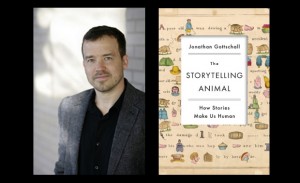EVENTS – MILAN JEWISH FESTIVAL Jonathan Gottschall: “We Are What We Tell”
During last Friday’s lecture in Mantua, at the Festivaletteratura, probably the best known literary festival in Italy, Jonathan Gottschall has explained how fiction is the most “ancient and powerful virtual reality technology, and it simulates the great dilemmas of human life.” Professor of English, literary exponent of Darwinism, prolific author, Gottschall writes with equal ease for the New York Times and for scientific journals. Today he will be in Milan, at the Sormani public library, where he will introduce the presentation of “Jewish and the City”, the international Jewish culture festival, this year at its second edition. Gottschall has given to the portal of Italian Jewry www. moked. it a text that gives an idea of what he’ll be explaining at the lecture for Jewish and the City, titled “We are what we tell”. A second speach, taking place at the Fondazione Feltrinelli in the late afternoon, is titled “The Storytelling Animal. How Stories Make us Human”, like his last book, that has been translated in Italian by Bollati Boringhieri, as “L’istinto di narrare. Come le storie ci hanno reso umani”.
Humans are the storytelling animal. We spin fantasies. We thrill to an astonishing multitude of fictions on pages, on stages, and on screens: murder stories, sex stories, war stories, conspiracy stories, true stories and false. We devour novels, films, and plays. Even sporting events and criminal trials unfold as narratives. We are, as a species, addicted to story. But the addiction runs deeper than we think. We can walk away from our books and our screens, but not from story. We dream, fantasize, and socialize in stories. Story infiltrates every aspect of how we live and think. Yet the world of story has long remained an undiscovered and unmapped country. It’ s easy to say that humans are “wired” for story, but why?
In this book, I argue that stories help us navigate life’s complex social problems—just as flight simulators prepare pilots for difficult situations. Storytelling has evolved, like other behaviors, to ensure our survival.
Drawing on the latest research in neuroscience, psychology, and evolutionary biology, I tell what it means to be a storytelling animal. Did you know that the more absorbed you are in a story, the more it changes your behavior? That all children act out the same kinds of stories, whether they grow up in a slum or a suburb? That people who read more fiction are more empathetic?
Of course, our story instinct has a darker side. It makes us vulnerable to conspiracy theories, advertisements, and narratives about ourselves that are more “truthy” than true. National myths can also be terribly dangerous: Hitler’s ambitions were partly fueled by a story.
But, as I show in this book, stories can also change the world for the better. Most successful stories are moral—they teach us how to live, whether explicitly or implicitly, and bind us together around common values. We know we are master shapers of story. The Storytelling Animal finally reveals how stories shape us, how the stories we tell shape our identities as individuals and groups.
In my talk for Jewish and the City I will also discuss how my recent discovery of my own Jewish ancestry has modified and enriched my own personal story.
*Jonathan Gottschall is a Professor of English, literary exponent of Darwinism, prolific author.

